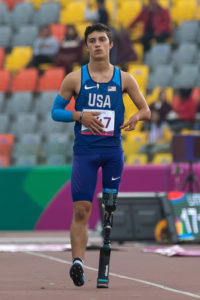The novel coronavirus has not been overlooked by hopeful Tokyo 2020 Paralympians and their families.
Going into the Tokyo 2020 Paralympics, athletes from all over the world, especially the United States, are keeping a watch on the spread of Coronavirus.
Clayton Frech, who runs the Angel City Games in Los Angeles, is the parent of Ezra Frech, a hopeful track and field competitor for the Tokyo 2020 Paralympics. The Frech family is worried about a possible novel coronavirus pandemic, but they are optimistic that the virus will dissipate and the 16th Paralympic Games will go on as planned.
“As a parent, I am monitoring the novel coronavirus closely,” Clayton says. “My wife and I are watching where it is moving and how quickly it is getting under control in the different countries. We are obviously hoping that it peaks soon.”
Clayton says Ezra will keep practicing the high jump, long jump and 100-meter dash. Ezra says if he makes the team, he will keep training no matter what the outcome.
“I trust that Team USA and the [International Paralympic Committee] will make the best decisions for the team and keep the athletes safe,” Ezra says.
Ezra added that he knows the best defense against catching the novel coronavirus.
“My mom has always taught me to wash and sanitize my hands frequently,” he says.

The Centers for Disease Control and Prevention website (cdc.gov) highlights three distinct ways the novel coronavirus can be spread:
- Between people who are in close contact with one another (within about 6 feet)
- Via respiratory droplets produced when an infected person coughs or sneezes
- Respiratory droplets landing in the mouths or noses of people who are nearby or possibly being inhaled into the lungs
Another way of catching the virus is by touching spots on unclean counters that may have been exposed to the virus, then touching your eyes, nose, ears or mouth.
The illness could be worse for Paralympians who don’t have full functioning bodies says the CDC in an emailed statement.
“Respiratory illnesses such as flu or [novel coronavirus] are particularly dangerous for people who may have trouble with muscle function, lung function or difficulty coughing, swallowing or clearing fluids from their airways. Serious complications can include pneumonia, secondary bacterial infections that can lead to blood infections (sepsis), and sudden difficulties breathing (acute respiratory distress syndrome).”
As for the Angel City Games (June 18-21), Clayton says they are also taking precautions.
“For novel coronavirus planning, we are actively monitoring and have started initial planning conversations with doctors and health care organizations in our community,” Clayton says. “However, our athletes, volunteers and spectators should know we will take all appropriate steps to ensure their safety.”
When asked for a comment about their plans for Tokyo 2020 and ensuring athlete safety with novel coronavirus looming, The United States Olympic and Paralympic Committee (USOPC) could not be reached for official comment.
However, the USOPC does have contingencies dating back to four years ago in Rio de Janeiro, when the Zika virus was a health scare at the 2016 Games. There is also an extensive set of quarantine protocols that include sealed-off spaces both inside and outside of the Tokyo 2020 Olympic/Paralympic Villages where many of the athletes will stay.
The USOPC facility in Colorado Springs, Colo., has access to a state-of-the-art testing system that can identify infectious diseases and possibly prevent their spread. However, the current system is not designed to detect the novel coronavirus.
Nine-time Paralympian Candace Cable, who is also vice chair of the Organizing Committee Board for Los Angeles 2028, weighed in on athletes potentially missing the Games because of the virus.
“There is a responsibility on the athlete and there’s an expectation of the Games organizers, the USOPC and coaches to build as much knowledge as possible on how to stay safe when problems arise. After that it’s up to the athlete to determine the risk they are willing to take,” Cable says. “If I was an athlete now, I would keep training, working toward my goals, push my leaders for information, learn all I can about the virus and how to stay safe. I would stay focused on my first plan and then create an emergency plan making sure all bases are covered.”
On March 5, the IPC sent out a statement for all athletes. The IPC reiterated its previous directive that the Games will go on as planned, and for now, the message to all athletes is to stay the course.
“Athletes should continue training and building their excitement for the Opening Ceremony in the spectacular Tokyo Olympic Stadium on Aug. 26,” the IPC says.
For more information on the novel coronavirus and tips about how to prevent transmission, visit cdc.gov.
2 Responses
Another informative article as we all look toward dealing with this virus on and off the field!
Great article about the athletes and the Coronavirus. Hope they stay safe and continue to work towards their goals without fear of contracting this disease.